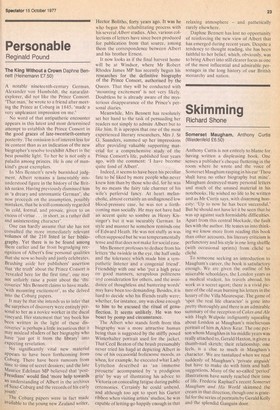Personable
Reginald Pound
The King Without a Crown Daphne Bennett (Heinemann £7.50) A notable nineteenth-century German, Alexander von Humboldt, the naturalistexplorer, did not like the Prince Consort. 'That man,' he wrote to a friend after meeting the Prince at Coburg in 1845, 'made a very unpleasant impression on me.'
No word of that antipathetic encounter appears in this latest and most determined attempt to establish the Prince Consort in the good graces of late-twentieth-century posterity. The omission is of interest less for its content than as an indication of the new biographer's resolve to exhibit Albert in the best possible light. To her he is not only a paladin among princes. He is one of mankind's great exemplars.
In Mrs Bennett's newly burnished judgment, Albert remains a lamentably misunderstood figure in the history of the British nation. Having previously dismissed him as 'a dreary and unromantic German', she now proceeds on the assumption, possibly mistaken, that he is still commonly regarded 'as cold, formal, and prosaic, given to an excess of virtue . .. in short, as a rather dull and uninteresting character'.
One can hardly assume that she has not consulted the more immediately relevant volumes of the 210 listed in her bibliography. Yet there is to be found among them earlier and far from begrudging recognition of Albert's fine personal qualities that she now so busily andjustly celebrates. Brushing aside her publishers' assertion that 'the truth' about the Prince Consort is 'revealed here for the first time', one may not unfairly. raise a point about the 'discoveries' Mrs Bennett claims to have made, 'with mounting excitement', as she delved into the Coburg papers.
It may be that she intends us to infer that the surprises of discovery were entirely personal to her as a novice worker in the ducal vineyard. Her statement that 'my book has been written in the light of these discoveries' is perhaps a little incautious that it may mislead readers of her biography who have 'just got it from the library' into expecting revelation. No significantly vital new material appears to have been forthcoming from Coburg. There have been rumours from time to time of secret dossiers; and the late Maurice Edelman MP believed that 'postFreudians' would find, 'more help towards an understanding of Albert in the archives of Saxe-Coburg and the records of his early Youth'.
The Coburg papers were in fact made available to the young new Zealand writer, Hector Bolitho, forty years ago. It was he who began the rehabilitating process with his several Albert studies. Also, various collections of letters have since been produced for publication from that source, among them the correspondence between Albert and his brother Ernest.
It now looks as if the final harvest home will be at Windsor, where Mr Robert Rhodes James MP has recently begun his researches for the definitive biography of the Prince Consort, authorised by the Queen. That they will be conducted with 'mounting excitement' is not very likely. Doubtless he is already aware of the mysterious disappearance of the Prince's personal diaries.
Meanwhile, Mrs Bennett has resolutely set her hand to the task of persuading her readers not simply to admire Albert but to like him. It is apropos that one of the most experienced literary researchers, Mrs J. St G. Saunders, summed up her impressions after providing valuable supporting material for a comprehensive study of the Prince Consort's life, published four years ago, with the comment: 'I have become. quite fond of Albert'.
Indeed, it seems to have been his peculiar fate to be liked by more people who never knew him than by those who did, for he was by no means the fairy tale charmer of his wife's perfervid fancy. At heart melancholic, almost certainly an undiagnosed low blood-pressure case, he was not a forthcoming man socially. He may not have had an accent quite so sombre as Henry Kissinger's but it was incurably German. In style and manner he somehow reminds one of Edward Heath. He was not stuffy as was often supposed but he was temperamentally tense and that does not make for social ease.
Mrs Bennett professes to deduce from his letters 'the twinkle in the eye, the half smile and the tolerance which made him a sympathetic listener and a congenial friend'. Friendship with one who 'put a high price on good manners, scrupulous politeness and consideration for others. and the avoidance of thoughtless and bantering words' may have been too demanding. Besides, it is hard to decide who his Iriends really were; whether, for instance, any was close enough to him to be excused the ritual of genuflection. It seems unlikely. He was too beset by pomp and circumstance.
The Albert who stands forth from this biography was a more attractive human being than is suggested by the stiffly posed Winterhalter portrait used for the jacket. That Cecil Beaton of the brush presumably never tried his had at depicting Albert in one of his occasionlil frolicsome moods, as when, for example, he executed what Lady Lyttelton described as 'an immense pirouette' accompanied by 'a prodigious grin' by way of illustrating his advice to Victoria on concealing fatigue during public ceremonies. Certainly he could unbend, 'and although too apt to sport his Garter ribbon when visiting artists' studios, he was capable of letting-go happily enough in that relaxing atmosphere — and pathetically rarely elsewhere.
Daphne Bennett has lost no opportunity of reinforcing the new view of Albert that has emerged during recent years. Despite a tendency to thought reading, she has been faithful to her belief, which, obviously, was to bring Albert into still clearer focus as one of the most influential and admirable personages in the long history of our British monarchy and nation. .


































 Previous page
Previous page